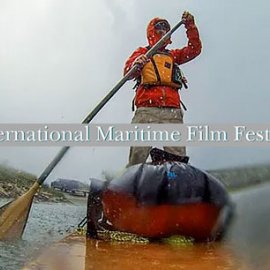International Maritime Film Festival
-
English
-
ListenPause
[intro music] Welcome to World Ocean Radio…. I’m Peter Neill, Director of the World Ocean Observatory In pursuit of tools by which to portray the ocean in its full dimension and to convince our neighbors and our leaders that it must be respected and conserved for the benefit of all life on earth, we use words, and sound, and images as means to affect our senses and our emotions and thereafter to shift our reasoning and our actions toward sustainability and preservation of its systems. World Ocean Radio is one such tactic. Words can paint a picture and, as a primarily a wordsmith, I am dedicated to that method as means. Sounds can speak for themselves, just as they can augment words. The underwater calls of whales is a hauntingly beautiful case in point – an eerie, almost alien vibration that evokes response, implies connection among creatures that are individual yet communal, and declares possession of an environment that reveals another mystery of life. And then there are pictures. We have begun to communicate with visuals, like hieroglyphs in a sequence of optical meanings intended to add up to something. We are diverted by stories told visually – graphics and cartoons, ads and animations, films as narrative and documentary, and social media where some communication strategies are based on the easy click bait of pretty pictures by which to enlist viewers exponentially to a cause. The key understanding here is that words, sounds, and images are the tools of narrative – the art of using story to reveal people, places, and ideas in a stream of encounter and meaning. There is tradecraft: the manipulation of time, voice, place, and metaphor to reveal connections and relevance, and to engage an audience rationally and emotionally. A good story will make you angry and make you cry, make you laugh and make you think, make you aware and make you act with new conviction. The ocean is an infinite scape for story, and to that end, the World Ocean Observatory has announced a partnership with Maine Street Bucksport for the presentation of the 4th Annual Maritime Film Festival, a celebration of maritime vitality through film on a broad range of themes from yachting and leisure, to boatbuilding and restoration, history and cultural heritage, environmental and ocean science, and more. If you know of such films, recently produced, please urge their immediate submission through www.withoutabox.com or www.filmfreeway.com. The Festival judging is not category-specific; rather, all films will be evaluated in relation to each other, in one of two tracks: Feature Length (40 minutes or more), or Shorts (under 40 minutes). All films are to be in English, or to carry English subtitles. Prizes are to be awarded and promoted through the World Ocean Observatory social media audience of over 800,000 Citizens of the Ocean worldwide. The festival will take place at the historic Alamo Theatre in Bucksport, Maine, September 27- 29, 2019. Other festival sponsors include Wooden Boat Magazine and The Island Institute. These films deserve an audience far beyond mid-coast Maine and our intent is to package these with winners from the prior year’s festivals into a national “voyage,” a tour for showings by maritime museums, environmental groups, educational institutions, and conservation organizations with interest in maritime affairs. If your organization would like to sponsor such an event locally, please contact World Ocean Observatory for further information. (info@thew2o.net) Words, sounds, and images: these can be combined into a powerful medium for communication. Alexander von Humboldt, the great 19th century naturalist, traveled the world observing and recording his surroundings in his journals, his descriptions, and his drawings; in “Views of Nature – Contemplations on the Sublime Phenomena of Creation with Scientific Illustrations”, published in 1850, he is said to have invented a new genre of nature writing, combining ”lively prose and rich landscape descriptions with detailed and evocative visual observations” that found its way down through a sequence of observers such as Charles Darwin, John James Audubon, Henry David Thoreau, John Muir, Aldo Leopold, Rachael Carson, Annie Dillard, and Barry Lopez, among many others. Today, film is the combinative medium of choice and the extension of this tradition, its purpose the same: to describe, convince, and protect the full dimension of Nature. We will discuss these issues, and more, in future editions of World Ocean Radio. [outro music]
The World Ocean Observatory is partnering with Main Street Bucksport this year for the 4th annual International Maritime Film Festival, a celebration of maritime heritage, spirit of adventure, concern for the environment, and ingenuity of boats and waterborne pursuits. In this week's episode of World Ocean Radio we discuss the upcoming festival and call for submissions, and reflect on the importance and power of the written word, photographs and film to make us aware of issues and to act toward change with new conviction.
Do you prefer the written word? Head on over to Medium.com/@TheW2O.
About World Ocean Radio
World Ocean Radio is a weekly series of five-minute audio essays available for syndicated use at no cost by college and community radio stations worldwide. Peter Neill, Director of the World Ocean Observatory and host of World Ocean Radio, provides coverage of a broad spectrum of ocean issues from science and education to advocacy and exemplary projects.
Image
IMFF, Bucksport, Maine
maritimefilmfestival.com
Resources
Our intent is to package this year's films with winners from the prior year’s festivals into a national tour for showings by maritime museums, environmental groups, educational institutions, and conservation organizations with interest in maritime affairs. If your organization would like to sponsor such an event locally, please contact us.
- Login to post comments



